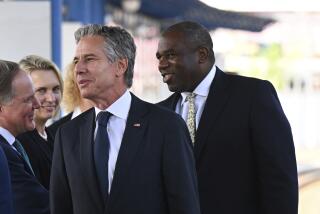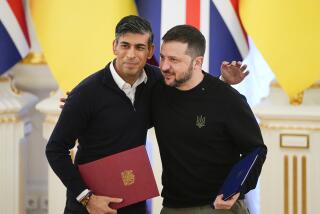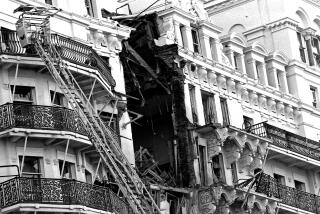Protector Cast in Role of Victim : Britain: Polls show Thatcher has strong support for the largest military deployment since the Falklands.
- Share via
LONDON — Three decades after withdrawing as imperial protector in the Persian Gulf region, Britain is struggling to cope with its new role as regional victim.
The Foreign Office confirmed on Monday the weekend death of a Briton believed to be the first foreigner killed by Iraqi troops in Kuwait, and it called on all Britons to maintain “very steady nerves.”
It said that an unprecedented diplomatic effort was under way with Iraq to bring about the release of an estimated 4,000 Britons believed to be trapped in Kuwait, a former British protectorate.
The British news media described Douglas Croskery, a businessman from Northern Ireland who was killed in Kuwait, as a national hero. It said that Croskery, who was shot by Iraqi soldiers Saturday night while trying to leave Kuwait, had died not for Britain alone but for the freedom of the entire Western world.
“Iraqis Murder Hero Briton,” the tabloid Daily Mail declared.
Scores of other Britons have managed to get out of Kuwait in the past few days. As they arrive in London, they are being cast as courageous warriors deserving of national honor and pride.
The news media have generally linked Croskery’s death to the deployment of the British jet fighters and naval vessels that are joining U.S. forces in Saudi Arabia and in the gulf.
Of all the nations that have condemned Iraqi President Saddam Hussein for his invasion of Kuwait, Britain is the only Western country besides the United States that so far has committed weaponry. Prime Minister Margaret Thatcher decided to do so within 24 hours of President Bush’s announcement of U.S. military intervention.
Her decision has generated surprisingly little criticism from her many political enemies, and two weekend polls indicate strong public support.
A Gallup poll published in the Sunday Telegraph found that 83% of those questioned supported Thatcher’s decision and that only 13% were opposed. It showed that 69% would favor a larger British military force “if necessary.”
The British contribution is a limited one, mainly air support. It includes a squadron of 12 Tornado jet fighters, which arrived at Saudi bases Saturday. An additional 12 Jaguar fighter-bombers are at bases in Oman near the entrance to the gulf.
Britain also deployed three Nimrod marine patrol aircraft, two naval frigates, a destroyer and weapons batteries that include Rapier anti-aircraft missile systems, Sidewinder air-to-air missiles and 1,000-pound cluster bombs that defense officials said could be used against Iraqi tanks.
Still, the exercise is being described as Britain’s largest military deployment since the Falklands War of 1982. And the Foreign Office made it clear that it may well be just the beginning.
“The British people must not think that dealing with this kind of dictator will be costless,” a Foreign Office spokesman, William Waldegrave, said in a statement. “It will need very steady nerves, as it did in the Falklands, but I do not want to specify particular actions at the present time.”
In reporting on its diplomatic efforts with Iraqi officials in London, Baghdad and Kuwait, the Foreign Office said that Iraq has agreed only to permit the Britons trapped in Kuwait to travel as far as Baghdad, and Britain has said that this is not satisfactory.
Nevertheless, the Foreign Office confirmed that a total of 54 Britons have managed to flee Kuwait on their own since last Friday.
Arriving at London’s Heathrow Airport, they have recounted harrowing tales about their experiences, and heart-rending family reunions have become standard fare on evening television.
Perhaps the most chilling story was told by Darrell and Pam Holt, who arrived with their three daughters Sunday on a flight from Saudi Arabia. Holt told of driving for three hours along a “secret route” through the Kuwaiti desert, then a daring dash to freedom after a sudden volley of machine-gun fire by Iraqi border guards only a few miles from the Saudi border.
His wife coolly described the incident at their apartment in the Kuwaiti capital that had provoked their departure.
“My maid came up and said there was an Iraqi soldier down in the basement who had been talking to the Germans (living in the apartment building),” she said. “I went upstairs and found the (German) woman had been raped. The soldier had tied the husband up, raped his wife and then made them sit down and have a cup of tea with him.”
Although such reports have helped to steel British resolve in the gulf crisis, they have also taken a harsh toll on the relatives of the thousands of Britons still in Iraq and Kuwait.
Joanna Copley, who helped set up two telephone “help lines” for the relatives, said the lines were jammed Monday.
“We’re absolutely snowed under,” she said. “Some of the people ringing us are so distressed, and these headlines are really not helping.”
More to Read
Sign up for Essential California
The most important California stories and recommendations in your inbox every morning.
You may occasionally receive promotional content from the Los Angeles Times.













